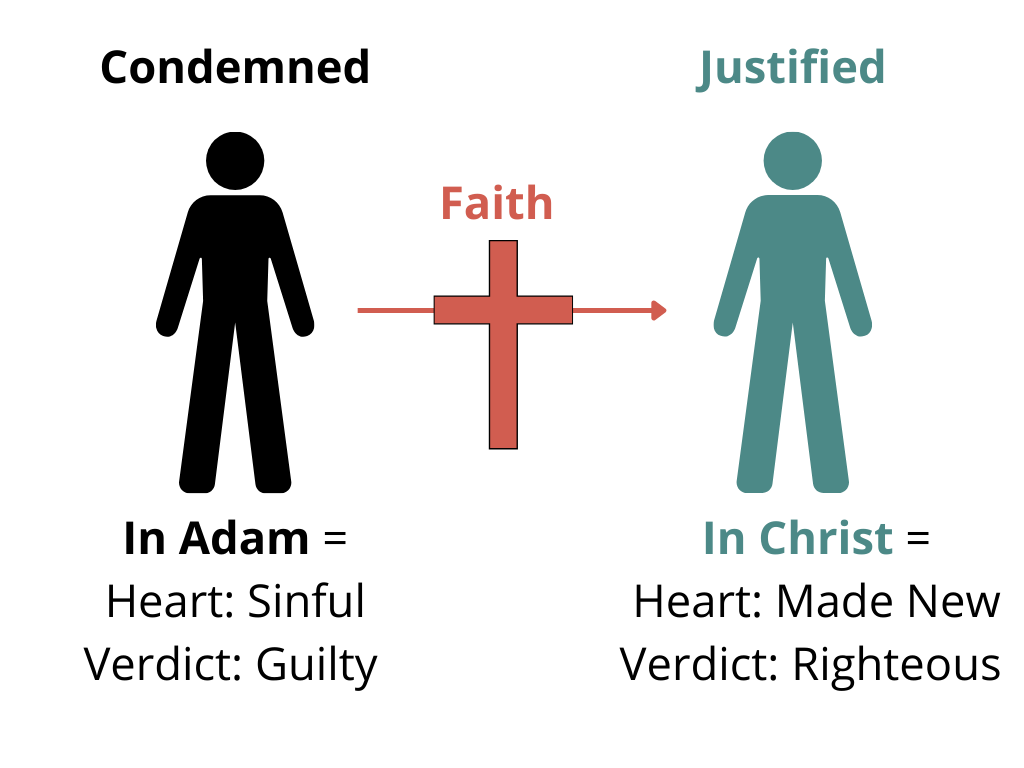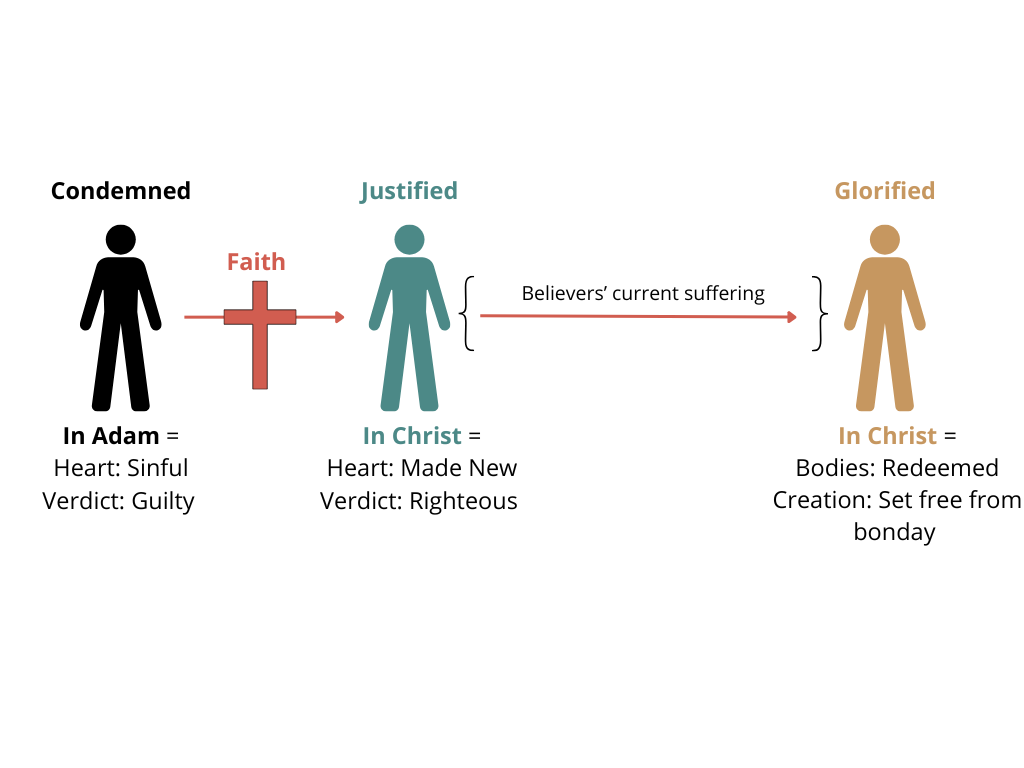Is God Sovereign or Do We Have Free Will?
Part 6c: A Word Study on 'Predestine' & 'Foreknow' (Exegesis of Romans 8:28)

Note: Romans is so theologically rich, that Substack told me I reached the email limit after I finished my work on 8:28. So my aim for next month’s article in this series to finish up verses 29-30.
I read a story recently where a pastor was fired for once reading Romans 8:28-30.1 Why? Because it contains the word “predestined.”
That’s how repulsive this idea can be to some. For a long time it was repulsive to me as well (I shared about that back in my first post in this series). And understandably, it’s a hard doctrine to wrap our minds around. But the truth is that the Bible does talk about predestination. And since the Bible is God’s Word, our call as believers is to try our best to understand what it means when it talks about it.
Romans 8:28-30 is a key text in this regard. That’s why we’re going to try and do some serious exegetical work on it. In this post we’ll put Romans 8 in its larger literary context and then focus our exegesis on verse 28 (in the next post I think we’ll be able to cover verses 29-30 together).
Strap in. It could get a little bumpy.
Romans 8:28-30 in its Literary Context
Romans 8 can be divided into 3 sections: 8:1-17, 18-30, 31-39. Our focus will be on the first two.
Paul’s emphasis in 8:1-17 is on the Christian’s present status as justified by faith in Christ (their guilt has been removed). Paul can tell the Roman Christians that there is now no condemnation for them because they are in Christ, after having been born in Adam (8:1; cf. 5:12). This is illustrated by the diagram below.

In the next section (8:18-30), Paul’s focus switches from the Christian’s present justification to future glorification. The paragraph itself is also bracketed by the words “glory” (8:18) and “glorified” (8:30), giving us a hint as to what it’s about.2 Several phrases likewise point to its futuristic bent, beginning with his assertion that the Roman Christians’ present suffering isn’t worthy to be compared with the glory that is to be revealed (cf. 8:20-21, 23, 24, 25). So glorious, in fact, that creation itself has been groaning for its revelation ever since the fall in Genesis 3 (Rom. 8:20-22). And that’s the point of 8:18-30. These believers in Rome were dealing with suffering and Paul encourages their perseverance by reminding of them of the certain glory that awaits them in eternity.
Douglas Moo captures Paul’s rhetorical strategy well when he writes, “Paul wants Christians to realize that they, along with the subhuman creation, are in the position of waiting and hoping for the culmination of God’s plan and purposes.”3

Or we could put it this way: Paul’s pastoral strategy for helping believers cope with present suffering in Romans 8:18-30 is to remind them of God’s sovereign plan to bring about their future glorification. And this is the larger point we must keep in mind as we dive into the weeds of verse 28.
Exegesis of Romans 8:28
There are three important questions that meet us in this verse: (1) What is the good that Paul has in mind? (2) Who is that good for? And (3) what is God’s purpose? So let’s take each one in turn.
What is the Good?
Given the immediate context, I think the good is the future glory that awaits all believers (i.e., eternal salvation). Paul’s point is that God uses even the hard things to aid in the believer’s perseverance in faith to ensure that we arrive home with Him safe and sound.4 In this way, 8:28 is an expansion of the same idea Paul introduced earlier in 5:2-5:
2 through whom we have gained access by faith into this grace in which we now stand. And we boast in the hope of the glory of God. 3 Not only so, but we also glory in our sufferings, because we know that suffering produces perseverance; 4 perseverance, character; and character, hope. 5 And hope does not put us to shame, because God’s love has been poured out into our hearts through the Holy Spirit, who has been given to us.
As my New Testament prof used to tell us back in the day, God has ironic processes in how He preserves His people. The sufferings which the world intends to pull us away from Christ are exactly the things He uses to keep us in Christ! What a great promise to cling to in the midst of suffering!
But question: who’s the us that I just spoke of?
Who is that Good For?
You already know the answer: believers. Right? But let’s press in just a bit more.
The diagram above shows that there are two indirect objects of the verb, “work together.” The first is for those who love God. That’s simple enough. But who are the ones who love God? That leads to the second indirect object: for the ones called according to God’s purpose.
When Paul uses the word “called” (sg: κλητὸς; pl: κλητοῖς), he uses it in two different, but related ways: First, he describes himself as being called by Christ to be an apostle. Second, he describes congregations as those who have been called by God to belong to Christ. Both of these uses show up in Romans 1:
Paul, a servant of Christ Jesus, called (κλητὸς) to be an apostle… 6 including you who are called (κλητοῖς) to belong to Jesus Christ. 7 To all those in Rome who are loved by God and called (κλητοῖς) to be saints… —Rom. 1:1, 6-7
He uses the word the same way in 1 Corinthians 1:2, 24.5 But this introduces a new question: what precisely does Paul mean when he describes believers as the called ones? New Testament scholar Tom Schreiner sums it up nicely: “The words calling and called in Paul regularly denote effective initiative in summoning people to salvation.”6
Whose initiative? God’s.
God is the one who effectively calls people to belong to Him. And the evidence of that effective call is our faith in Christ.7 These Roman believers could be assured that they had been called to belong to God because they were trusting in Christ for salvation. In this way, faith on our part is present, but it is sourced in God’s first calling us to believe. He’s the One who takes the initiative in the believer’s salvation. This can be seen when we take note of how Paul uses the word “call” in its verbal form (καλέω). Here are a few examples:
In Romans 9:11, Paul says that God’s purpose of election does not continue on the basis of a person’s meritorious works “but because of him who calls.”
A few lines down, Paul equates believers whom God prepared beforehand for glory with “us whom he has called.”
In the introduction of his first letter to the Corinthian church, Paul reminds them that, “God is faithful, by whom you were called into the fellowship of His Son, Jesus Christ our Lord” (1 Cor. 1:9). This example is particularly important because in the remainder of the chapter he ties together the concept of God’s calling and election:
“For consider your calling, brothers: not many of you were wise according to worldly standards, not many were powerful, not many were of noble birth. But God chose what is foolish in the world to shame the wise; God chose what is weak in the world to shame the strong; God chose what id despised in the world, even the things that are not, to bring to nothing the things that are, so that no human being might boast in the presence of God. And because of him you (pl.) are in Christ Jesus… —1 Cor. 1:26-30
In Galatians 1:6, Paul warns the Galatian church not to turn to a different gospel by reminding them that if they do, they’ll be abandoning “him who called you in the grace of Christ.”8
In 1 Thessalonians, God’s calling is used by Paul to motivate Christian obedience: “we exhorted each one of you and encouraged you and charged you to walk in a manner worthy of God, who calls you into his own kingdom and glory” (1 Thess. 2:12). Later on in 4:7, he attaches this calling not only to salvation, but to our personal holiness: “For God has not called us for impurity, but in holiness.” He brings that letter to a close by expressing his confidence in their ongoing sanctification, not because of their ability, but God’s: “Now may the God of peace himself sanctify you (pl.) completely, and may your whole spirit and body be kept blameless at the coming of our Lord Jesus Christ. He who calls you is faithful; he will surely do it.” (1 Thess. 5:23-24)
In his second letter to the Thessalonians, he ties calling to election in a manner similar to the 1 Corinthians 1 passage cited above: “But we ought always to give thanks to God for you, brothers beloved by the Lord, because God chose you (pl.) as the firstfruits to be saved, through sanctification by the Spirit and belief in the truth. To this he called you (pl.) through our gospel, so that you may obtain the glory of our Lord Jesus Christ” (2 Thess. 2:13-14).
Okay, ready for a breather? Here’s a great Nate Bargatze clip:
Okay — let’s get back to it.
So God works all things for the good of believers — those whom He has graciously called to belong to Himself and… according to his purpose. That brings us to our last question concerning Romans 8:28.
What is God’s Purpose?
The word for purpose is πρόθεσιν (prothesin) and is used by Paul in a four other places: Romans 9:11; Ephesians 1:11, 3:11; 2 Timothy 1:9.
In Romans 9:11, Paul says that God’s purpose is tied up with his election of Jacob to continue the covenant line. When we turn to Ephesians, both usages carry a similar meaning. In 1:11 it describes God’s goal for those whom He predestined — to receive an inheritance as those who have been adopted by Him (1:5). And in 3:11, it’s tied closely with 3:10 where Paul says that God’s goal for the church was to display his wisdom to the rulers and authorities in saving sinners through Christ. Finally, in 2 Timothy 1:9, Paul reminds Timothy of God’s glorious purpose as a motivation for him to endure suffering. It’s so beautiful, I’m going to include verse 8 (note also the language of God’s calling):
8 Therefore do not be ashamed of the testimony about our Lord, nor of me his prisoner, but share in suffering for the gospel by the power of God, 9 who saved us and called us to a holy calling, not because of our works but because of his own purpose and grace, which he gave us in Christ Jesus before the ages began.
In other words, the assurance that God destined Timothy for eternal glory before the ages began is what ought to fuel his perseverance through suffering. In this sense, God’s sovereignty in our salvation is what propels us into action! And Paul is doing a very similar thing in Romans 8. That means that these other usages of “purpose” should shape the way we define it in 8:28. His purpose is to bring those who are His to eternal glory.
Concluding Thoughts on Romans 8:28
Alright, let’s see if we can put a bow on this thing.
Romans 8 is about encouraging Christians to persevere in suffering because of their guaranteed, glorious future.
Verse 28, in particular, reminds the Roman Christians that they have been called by God for this glorious purpose. And even the suffering they’re enduring now is not outside of God’s redemptive plan. Indeed, He uses all things to ensure that His glorious purpose for them will be accomplished.
And it’s this purpose which Paul will continue to unpack in verses 29-30.
********
That’s all the time I have for now. Thank you so much for yours!
Warmly,
Drew
P.S. if you liked this article, you may also like…
Is God Sovereign or Do We Have Free Will?
“Now, you don’t believe in predestination do you?” A seemingly innocent question from a sweet, older church lady. To be honest, she asked it half-jokingly.
You can read that story by Joshua Hutchens in full here: “There’s No Such Thing as Predestination” Stories about Calvinism from a High School Southern Gospel DJ.
I actually talked with a former member of this church who was present at the business meeting Joshua describes and confirmed the accuracy of the article.
Ibid.
Ibid.
Ibid., 530.
The same usage can be found outside of Paul’s writings in Jude 1:1 and Revelation 17:14.
Thomas R. Schreiner, Paul, Apostle of God’s Glory in Christ: A Pauline Theology, (Downers Grove, IL: IVP Academic, 2020), 30.
This also fits nicely with how Jesus describes the relationship between God’s sovereignty and human responsibility in salvation in John 6:35-40.
In this passage we meet again the mystery of God’s sovereignty and human responsibility. For more on how the New Testament describes Christian perseverance, see my previous article: Once Saved Always Saved? Why Christian Perseverance is Biblical and Critical.





